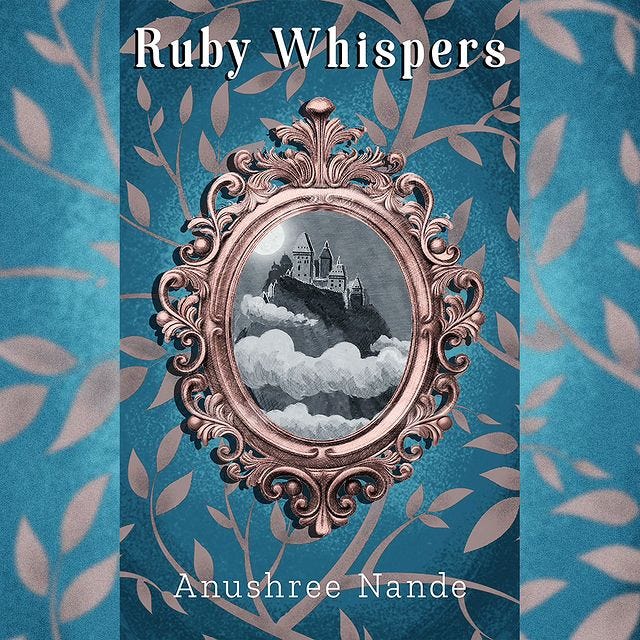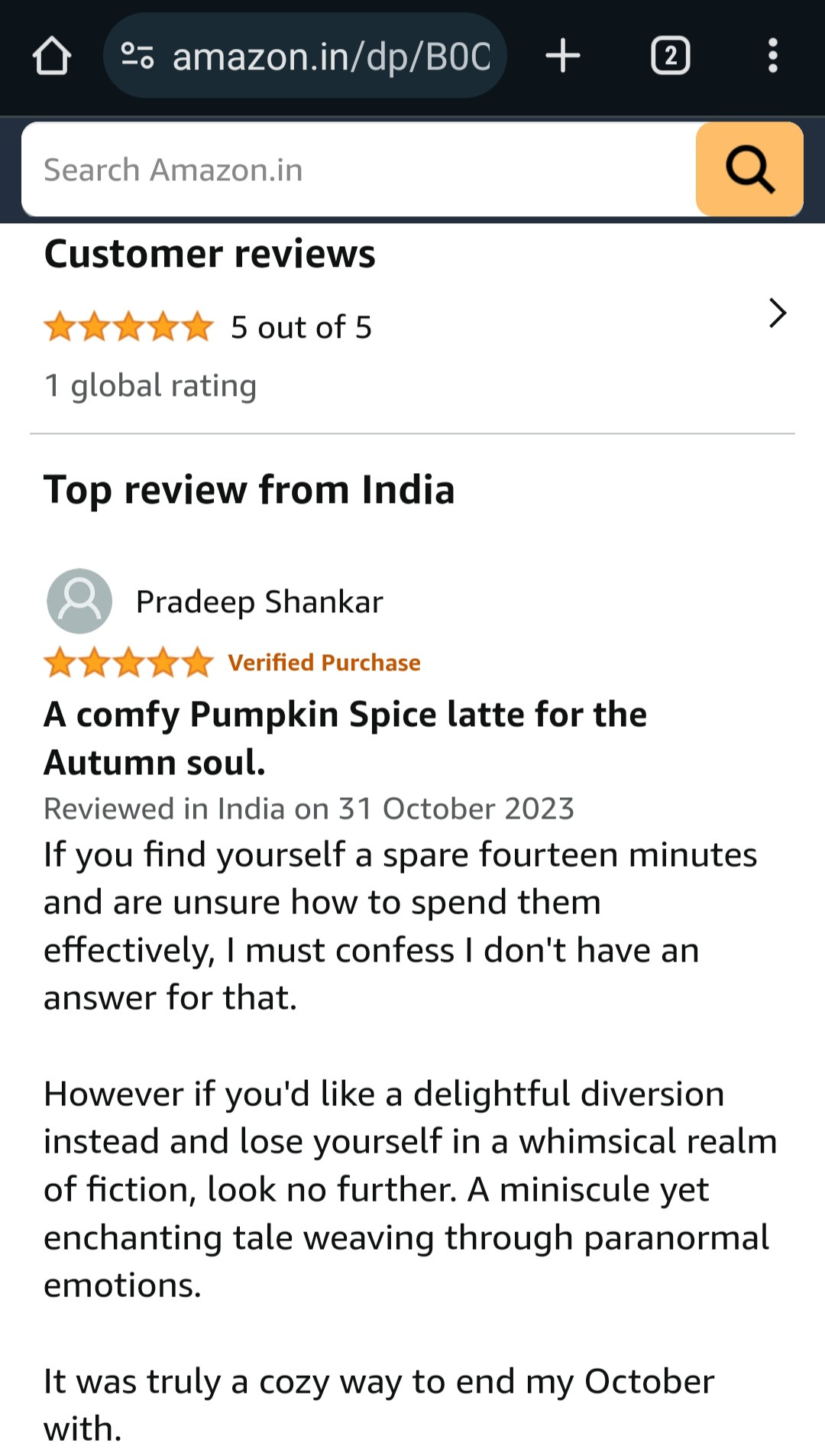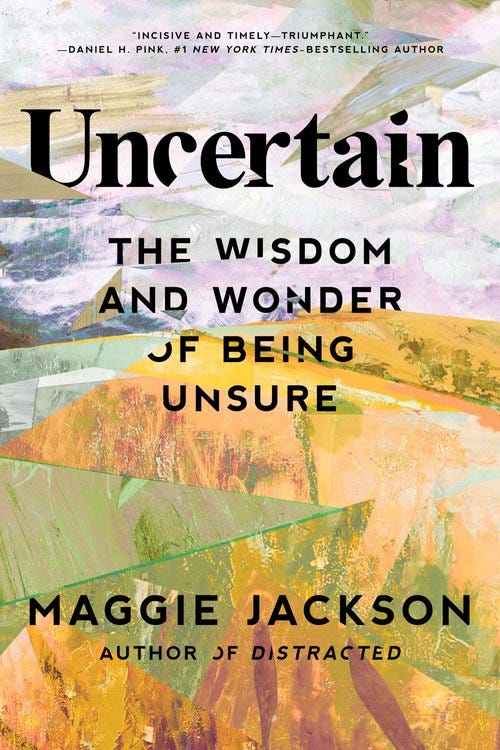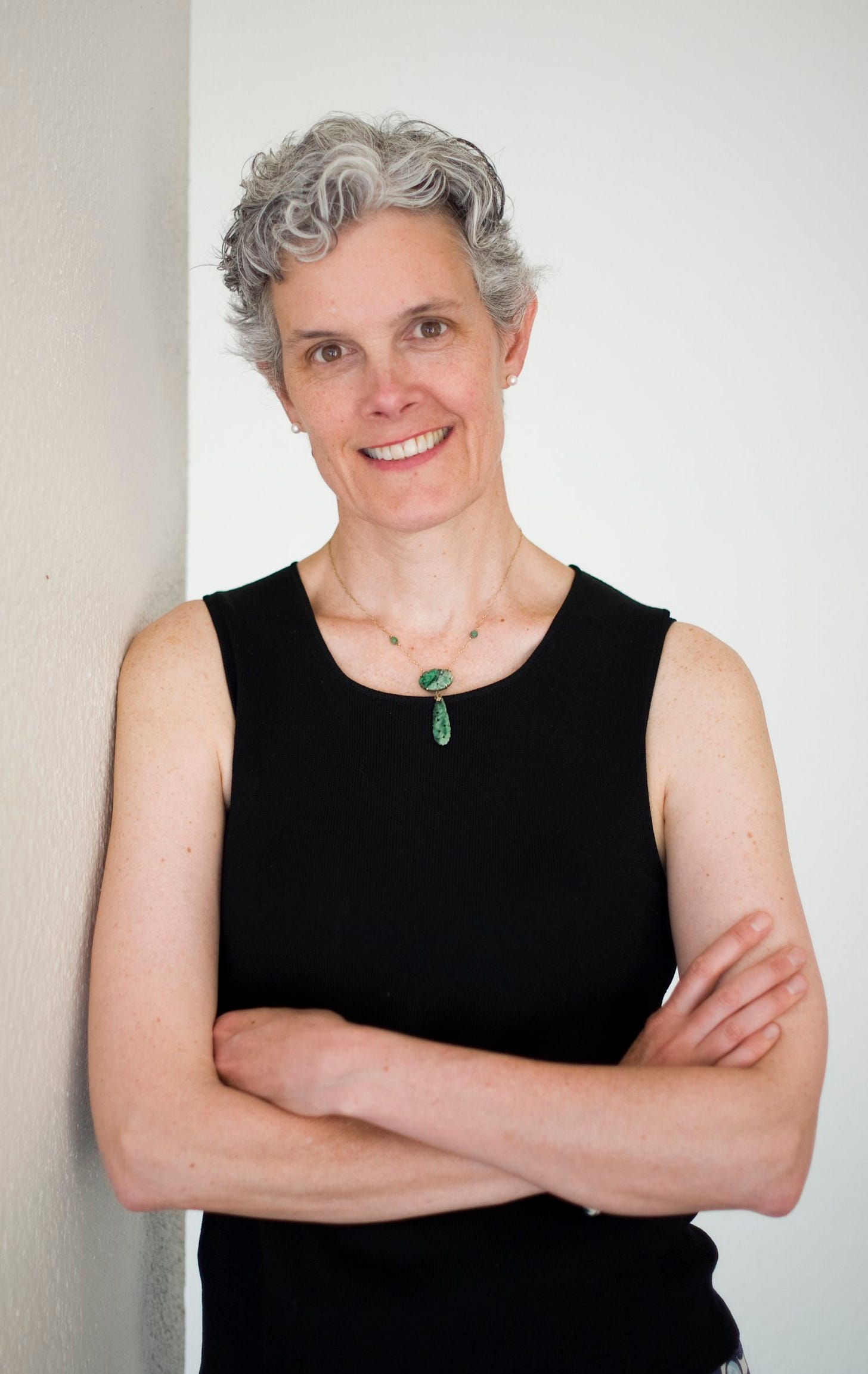Anu Recommends #39
A chat with author Maggie Jackson about the wisdom and wonder of uncertainty
Hi and welcome to the Storyteller!
Today I have a very special guest here to talk about her new book, out this Tuesday. But before that, a few bits and bobs related to my new flash fiction, ‘Ruby Whispers’.
It’s now available to buy or lend (free if you have Kindle Unlimited) in all Amazon Kindle marketplaces; here are the main ones—
India: https://www.amazon.in/dp/B0CLVNMS5L
USA: https://www.amazon.com/dp/B0CLVNMS5L
UK: https://www.amazon.co.uk/dp/B0CLVNMS5L
(For those who don't have a Kindle, you can still buy and read the story via the free Kindle app for Android, iOS, your desktop/laptop/tablet.)
It also has a Goodreads page now: https://www.goodreads.com/book/show/200753758-ruby-whispers
as well as its very first review—
I know I’ve said this before, but I will say it again. Reviews, shoutouts, and word-of-mouth are vital to the indie author ecosystem in a way that they aren’t for traditionally published authors (though, to clarify, they will never be unimportant there), and so if you enjoy an independent author’s work, please take out a minute of your time to post a review on Amazon, Goodreads, as well as any social media platforms you’re on; share it with friends and family that you think will enjoy it. Reach out and tell the author. Trust me, they will always want to hear from readers 😊
Uncertain: The Wisdom and Wonder of Being Unsure
Now onto today’s guest who is an award-winning author and journalist.
Uncertain: The Wisdom and Wonder of Being Unsure (November 7, Prometheus Books) is a current National Book Award nominee—after reading the ARC so kindly provided by Maggie who discovered the newsletter via another Storyteller alumnus, Nina MacLaughlin, I can see why the early reviews have been so glowing. I can’t say I understood or absorbed everything written among its 300-odd pages (it’s a book you need to take your time with; multiple reads for the full reward), but it gave me much food for thought, and also some solace in many ways.
Publisher’s blurb:
In an era of terrifying unpredictability, the swift, sure answer seems just right. We race to address precarity and complexity with neat algorithms, crisp bullet points, or hurried tweets. Who has time to dally in the wilderness of being unsure? How could we find the clarity and vision so urgently needed today by not-knowing? Uncertain is about the unsung triumph of doing just that.
Far from luring us into inertia or defeat, uncertainty powers good judgement, cognitive flexibility, creativity, curiosity, and even resilience. A state of mind critical to human achievement yet until recently little understood, uncertainty is the portal to finding your enemy’s humanity, the lynchpin of superior teamwork, and the mindset most needed in times of flux.
A scientific adventure tale set on the front lines of a volatile era, this book explores uncertainty's positive role in the life of the mind and in contemporary society. What is a good daydream? Why is being unsure now seen as a healthy form of stress? Why do AI's top leaders see uncertainty as the key to keeping humanity safe from increasingly unstoppable AI?
By learning to wielding uncertainty with skill and care, we can recapture realms of good thinking sidelined in an era of push-button thought. We can discover all that the human mind - at the peak of its powers in the most difficult predicaments – can do. This is not weakness but wisdom.
According to her bio,
Maggie Jackson is known for her pioneering writings on social trends, particularly technology’s impact on humanity. Her acclaimed book Distracted sparked a global conversation on the steep costs of fragmenting our attention and won the 2020 Dorothy Lee Book Award for outstanding scholarship in the ecology of culture. A former contributing columnist for the Boston Globe, Jackson has written for the New York Times, Wall Street Journal, New Philosopher, and other publications worldwide. Her writings have been translated into multiple languages and appear in numerous anthologies, including Living with Robots and The State of the American Mind. She has been featured in media around the globe, including MSNBC, Wired.com, NPR’s All Things Considered, the Sunday Times (UK), and Oprah Radio, and has presented at Google, Harvard Business School, and the Chautauqua Institute, among other venues. Her 2021 essay on uncertainty was named a “Best of the Foreign Press” by Le Monde’s Paris-based magazine Courrier International. Jackson lives in New York and Rhode Island.
I’m writing something about Uncertain that I’ll share once ready, but for now, let’s hear from Maggie herself, who’s been very generous with her time and insights.
Anu: Welcome to the Storyteller, Maggie! I would love to know how you started writing, your journey so far, and what brought you to where you are now.
Maggie: Sure! Ever since I was five years old, I was interested in being a writer, which then moved into journalism—I was a foreign correspondent in Europe and Asia, and I was always writing. About social trends, the larger trends, largely for American audiences (when I was abroad). Then, I was actually one of the first columnists or writers to cover the whole work family issue back in the 90s, which led me to be interested in the impact of technology on people’s lives because the smartphone, the laptop, etc., are changing our home lives and our work lives. So I've been covering these long social trends for a long time.
And when I fast forward a bit, I wrote a book. Well, first I wrote a book about the changing nature of home in the digital age. Then my second book was about the nature of attention or really how we can pay attention in a time of such fragmentation, such interruptions, and distractions. Which led me to ask the question: if you have a moment's focus or you have this skill and focus, then what can you do? How do you think? And how can we think well in, again, this time of digital virtual living, boundary list living, et cetera? it's just changed humanity's experience of time and space, our minds, our social relationships, as we all know.
So I began to write a book about thinking. But about the kinds of thinking I felt were being backburnered or even, I guess, undermined in our time. Deliberative, contemplative, slower types of thinking. And that led me to the first chapter about uncertainty because I thought, I can't really think openly and in depth without being uncertain at some point. But I really thought it was sort of a preface to the real work of thinking. And of course, I was wrong. Through a wise editor's comment and then someone’s feedback from an audience when I was speaking about this, I began to realise that really, how about writing about uncertainty?
Uncertainty is something active and dynamic and far more productive and fruitful than our assumptions, than our assumptions lend us to think it to be. We so often feel that uncertainty is equated with inertia or paralysis, with weakness and with incompetence. But I found that that was very much not the case and that there was this sort of unsung story related to uncertainty. When I began trying to research and study and examine uncertainty, I realised that there were a lot of books that were wonderfully arguing for embracing uncertainty, but without a lot of science behind them. And even then the dominant conversation was probabilistic mathematical risk analysis that was trying to basically abolish or get rid of, or, at least, measure, uncertainty, unpredictability, really. But the epistemic, the not knowing that occurs when we confront the new and the unknown and the murky ambiguous was not only ignored or largely neglected in research studies for many, many years—because people are so knowledge-centric and efficiency-centric—but also, there was an explosion of new research, new recognition of the importance of our uncertainty.
And so it actually turned out to be a great time to write a book about this topic.
Anu: It's definitely a very important book that I'm going to be recommending to many people. There are a lot of the things in there where you anecdotally talk and think about it. But when you see the science and when you see everything, you're like, yes, this is why. It makes sense. I'm glad you wrote about this. What led you to the daydream? I know you started with uncertainty, but how did you end up in the realm of the daydream?
Maggie: Yes. Well, sometimes I just have hunches. And it's funny, that chapter falls in the middle of the book, and yet it was one of the first chapters I did, even before I thought about doing uncertainty, because I felt daydreaming was this sort of lost art, and I felt as though that was something that was very, very important for us to make time for. How important and why it's important really surprised me, which was just fascinating—the science behind it and how it actually helps us create a life, why it's very future-oriented and has so much to do with not just airy fairy nothingness and sort of optional aspects of our life, although we do daydream obviously about those. But I didn't know how core it is to humanity.
So I wrote that chapter and then as I investigated that aspect, I realised more and more that the book was about uncertainty, I realised that it was really important to me to expand or to investigate a topic, but in new ways or in expansive ways. So if I ask you about a topic of uncertainty, you might not actually think, oh, well, that'll include a chapter on daydreaming. But I think I like to cast a really wide net. I realised that daydreaming fit into that—it sort of helps us understand the idea of uncertainty as a spaciousness, which is what the writer of Rebecca Solnit, that's her term, spaciousness and uncertainty, which I love, because I always thought of it as a space, because almost invariably, it does include uncertainty, being uncertain does include a slowing down or a pause. There's not a lot of research about that, but that's just the way it is. And then within that space are many possibilities.
So that's exactly what we're doing when we daydream. We're trying things out, we're testing things out, and it's absolutely fascinating. And there are people who say they don't dream, but largely, I'm talking about sleeping and dreaming, largely, they just don't remember. And they're people who actually tell me they don't daydream, but I think largely they don't recognise it, or, again, the cultural bias against daydreaming is such that they don't want to think about those thoughts as being daydreams.
So yeah, I love that.
And then, while poking around in the daydreaming world, I stumbled upon this phenomenal scientist in Boston who's just basically a genius and world renowned. He was so candid and so honest and so supportive of his daydreaming habit that he attributes his success to. But he's fighting an uphill battle because people want to be productive.
Anu: I'm curious to know what your process was like writing this book, and how long you worked on it.
Maggie: Well, there were little fits and starts and then I worked for a think tank. I would say that the core book started in 2016. So it's been seven years, I would say for the, you know, real work of this book. So it was slow going, and let me tell you that it was the most difficult book that I've written—not that I've written that many, but to frame it, to understand, you know, I had issues or topics that I wanted to put into it. But it was very hard to understand how to bring uncertainty to life, to make it abstract, to be very close to the uncertainty research, which is booming. At the same time, the people who are researching uncertainty would say, yes, this is all about uncertainty, but it might not be named that way in databases. But therefore you have to be kind of creative. And then finding these stories of people and spending time with them and getting the right people, that all takes a tremendous amount of time.
Anu: There are so many things from the book that I've personally taken away, but if there was one thing you would want readers to take away from the book, what would it be?
Maggie: Oh, that's a good question, I haven't heard that one yet. I guess I would say that what's surprising is the extent to which something, a state of mind, that we fear is actually so important, so critical for our cognitive skills—for fostering the cognitive skills, for creating the kind of mindset that we need in times of flux. Because uncertainty really is all about wakefulness and being on the edge of what you know and being attuned to what's going on to change. It's such a dynamic kind of state of mind. That means that when you're uncertain, you're really on the cusp of learning something new or waking up to what's happening right now instead of sheltering in your assumptions and your old knowledge.
I was already really aware of why we need this type of thinking in this age of sureness and certainty, but I was really surprised at why we need this type of thinking in a time of flux and volatility. It's really nature's way or evolution's way of creating an organism that doesn't just leap to judgments and race past important information. Something we need in contemporary modern life when discomfort is something that you can click away from. It's really important to settle into, or into habit even. And this is really important even for a couple of minutes, even for seconds, you know. That was true of memory, that was true of crisis decision-making—we don't have to go to the mountaintop and be monastic. It’s perfectly fine to pause and be unsure of our life and be stuck. It's really a matter of bringing that tool into our cognitive skill-set.
Anu: Because you don't need that break to find uncertainty, you can just kind of live it.
Maggie: Exactly, you can seek it and it can come to you.
Anu: You've written a couple of books, and you've done a whole bunch of reporting. What draws you to the stories that you write, what makes you go there?
Maggie: Oh, that's a good question too! I became aware during the process of writing this book that I was actually finishing a trilogy: home, attention, and uncertainty are three aspects of humanity that are so critical, and yet so woven into our days that we don't really think about them very much explicitly. We don't examine them and they're also very maligned and misunderstood. I guess I'm drawn to large topics and to issues or topics, not all cerebral or mental by any means, but to very big questions.
And, of course, I think with any writer, maybe this is true for you, but to some extent, there are personal reasons why I'm drawn to these issues. I was adopted, and so the issue of home is really important to the issue of who you are and where your home is. Then the issue of attention, there could be a lot of different reasons about that. I'm kind of interested in the idea of presence because I had a kind of rocky childhood. I mean, not the most rocky and, you know, I had food on the table, and a roof over my head, but it was a precarious childhood. So for multiple reasons, I was always interested in attention as a sort of mana for the human soul.
And then this one, again, it's the same sort of thing. These are all very personal books to me. It follows through from what I was saying about the process of writing and how I kind of went my way through and around these topics to get to the final. I mean, it could go a different way, it could have gone a completely different way. I really, truly believe that I'm only asking a question in the long run. I know I don't have answers, but I'm always trying to pose a question. I just want to sort of pull something out into the public eye, even if it’s a few people, or few more people. It’s about pulling out an issue that I think deserves a little more attention than maybe we pay to it, while also trying to provoke people to do some thinking on their part. I would never write a “how to” manual, I'm just trying to instigate really.
An interesting kind of thread running throughout the book was how many of the topics I’ve included and written about in the book were those you weren’t “supposed” to study. For example, studying daydreaming was called a “career killer”. For researchers, if you touch that you were seen as strange, it wasn’t mainstream science.
Anu: Finally, what are some of the books you’d like to recommend to readers of The Storyteller?
Maggie: Here is a list of books that have touched me and that I'd recommend—
On uncertainty:
The Cunning of Uncertainty by Helga Nowotny - An exploration of how and why uncertainty is critical in research and modern life by an Austrian-born former head of the European Research Council.
How We Learn by Stanislas Dehaene - This renowned French neuroscientist has a gift for translating the latest science into readable prose. I write about his work in Uncertain.
Wabi-Sabi, the Japanese Art of Impermanence by Andrew Juniper - A primer on why objects and experiences that are imperfect, impermanent and incomplete are prized in Japan. Having lived in Japan for three years and studied uncertainty for many years, I am drawn to Wabi-Sabi.
How We Think, by John Dewey - The great US philosopher John Dewey's treaty on thinking well is lucid, prescient, and practical.
When We Cease to Understand the World by Benjamin Labatut - The Chilean writer's gripping part-fictional, part-non-fictional glimpse into the scientific mind.
On writing:
I love books on the craft of writing, and here are a few favourites that especially touch on the mysteries of harnessing not-knowing in pursuit of literary endeavours.
Daily Rituals: How Artists Work and its sequel Daily Rituals: Women at Work by Mason Currey - These snippets of the daily habits of artists, composers, writers, and others are illuminating and inspiring. In sum, there's no one way to be creative!
A Swim in a Pond in the Rain by George Saunders - The great writer's amazing class on Russian literature is put to the page, beautifully.
Letters to a Young Writer by Colum McCann - The Irish writer's short, pithy lessons on writing is soothing and insightful.
On pivot points in history:
The Order of the Day by Eric Vuillard - An eye-opening cinematic peek into the origins of WWII by a French filmmaker.
The Rosetta Stone by John Ray - A short, potent (and sometimes humorous) look at the global race to decode the Rosetta stone by a University of Cambridge Egyptologist.
The Lighthouse Stevensons by Bella Bathurst - An amazing family biography of the Scottish family of engineers that built the first modern lighthouses in Scotland; it’s a true tale of harnessing uncertainty. Writer Robert Louis Stevenson was the family rebel!
And memoirs:
I love the childhood memoirs of people who were resilient amidst precarity.
My Childhood by Maxim Gorky - The Russian writer's extraordinarily hardscrabble early life.
Aké, the Years of Childhood by Wole Soyinka - The Nobel-prize winning Nigerian writer tells a rollicking tale.
The Universe in a Single Atom by the Dalai Lama - The memoir of the early life of a brilliant and compassionate thinker who is never satisfied with easy answers.
Thank you so much for taking the time out to answer my questions, Maggie, and for being so kind and expansive with your recommendations!
You can find her at her website, which includes buy links for Uncertain and her other books, and her online writings.
As always, please feel free send in recommendations—books, movie, TV shows, authors to interview, ideas of what you’d like me to write on, rants/ramblings/excited monologues, GIFs and memes (especially them) and more. Just drop me a line and turn this into a conversation, even if just to say hi and let me know what you thought of the latest issue 😊 Or share this with someone you think might enjoy it.
Take care and I’ll see you on November 26th, for another very special interview! Along with some other bookish tidbits.
Anu
If you really like the newsletter, please feel free to buy me a coffee: https://ko-fi.com/anushreenande
If you wish to upgrade to a paid subscription in a currency other than Indian rupees, please email me at anushree.nande@gmail.com (which is also the address associated with my PayPal account).
You can find me on Twitter at @AnuNande (follow for all the football chatter) and on Instagram at @booksinboston.






This sounds like a thought provoking book and a great support for a daydreamer like me. :) Thank you, Anu, for introducing such diverse topics and authors.
This sounds like a wonderful book on a much-ignored topic. Social media has accelerated the tendency to make snap judgements and join warring camps on almost every issue. Not taking sides is derided as fence-sitting, whereas in truth, careful consideration of any nuanced problem is bound to cause uncertainty.
Thanks for the feature. Adding this to my TBR!